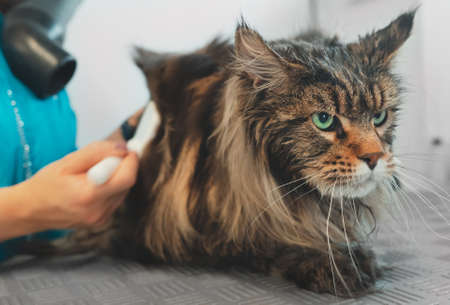Understanding Your Cat’s Nutritional Needs
When it comes to ensuring your cat’s health and longevity, understanding their nutritional needs is the first step. Cats are obligate carnivores, which means their bodies are designed to thrive on a diet rich in animal-based proteins and specific nutrients that come from meat. Unlike dogs or humans, cats can’t efficiently process carbohydrates or plant-based foods, making their dietary requirements uniquely different. This distinction is crucial when considering supplements for your feline friend.
Protein is the foundation of a healthy cat diet, supplying essential amino acids like taurine and arginine—nutrients cats cannot produce themselves. Deficiencies in these areas can lead to severe health issues such as heart disease or vision problems. Additionally, cats need a balanced intake of vitamins like A, D, and B-complex, as well as minerals including calcium and phosphorus. Notably, vitamin A from plant sources isn’t usable by cats; they need preformed vitamin A found only in animal tissues.
Because commercial cat foods may not always meet every individual cat’s needs—especially for seniors, kittens, or those with medical conditions—supplements can play an important role. However, choosing the right supplement starts with understanding what your cat naturally requires. Always look for products specifically formulated for cats and avoid those intended for other animals or humans, as inappropriate supplements can cause more harm than good.
For example, omega-3 fatty acids like EPA and DHA are vital for brain function and coat health but are often low in standard cat diets. Supplements derived from fish oil can fill this gap effectively. Similarly, probiotics tailored for felines help maintain digestive health and immune function, especially after antibiotic treatments or periods of stress.
The key takeaway: every cat has unique needs based on age, lifestyle, and health status. Consulting your veterinarian before introducing any supplement ensures you’re supporting your cat’s wellness safely and effectively. By focusing on the basics of feline nutrition and respecting their carnivorous nature, you’ll make smarter choices that support your cat’s long-term vitality.
Essential Supplements for Overall Health
When it comes to boosting your cat’s health and longevity, starting with foundational supplements is key. These essentials help support your cat’s immune system, digestion, skin and coat health, and overall vitality. Let’s take a closer look at three must-have supplements for every cat parent who wants their furry friend to thrive.
Omega-3 Fatty Acids: For Skin, Coat, and Heart
Omega-3 fatty acids, commonly found in fish oil supplements, are vital for maintaining a shiny coat and healthy skin. They also play a role in supporting heart health and reducing inflammation—a big plus for cats with arthritis or joint issues. In the U.S., many vets recommend omega-3s as part of a regular wellness routine, especially for aging cats or those prone to dry skin and allergies.
Probiotics: Digestive and Immune Support
Probiotics are beneficial bacteria that help maintain your cat’s gut health. A balanced gut can make a world of difference when it comes to digestion, nutrient absorption, and even your cat’s mood. American pet owners often use probiotics when their cats experience digestive upsets from food changes or stress (like moving homes). Probiotics can also bolster immunity, making them a smart choice year-round.
Vitamins: Everyday Vitality Boosters
Cats need a range of vitamins—like A, B-complex, D, and E—to keep their bodies functioning smoothly. While high-quality commercial cat foods provide basic nutrition, some cats (especially seniors or those on special diets) may benefit from extra vitamin support. Always consult your vet before adding vitamin supplements to avoid overdosing fat-soluble vitamins like A and D.
| Supplement | Main Benefits | Common Sources |
|---|---|---|
| Omega-3 Fatty Acids | Healthy skin/coat, heart health, anti-inflammatory | Fish oil (salmon, sardine) |
| Probiotics | Digestive balance, immune support | Powders or chews with live cultures |
| Vitamins (A, B-complex, D, E) | Energy, vision, immune function | Multivitamin formulas for cats |
Incorporating these essential supplements into your cat’s daily routine can set the stage for lifelong wellness. Remember: always introduce new supplements gradually and under your veterinarian’s guidance for the best results tailored to your cat’s unique needs.

3. Targeted Supplements for Senior Cats
As your cat enters its golden years, their nutritional needs can shift dramatically. Just like people, senior cats often require more specialized support to maintain their quality of life. Here are some targeted supplements that can make a real difference for aging felines.
Joint Support for Mobility
Older cats commonly develop joint issues such as arthritis or stiffness, which can impact their mobility and happiness. Supplements containing glucosamine, chondroitin, and MSM (methylsulfonylmethane) are popular choices in the United States. These ingredients work together to cushion joints, ease inflammation, and support cartilage repair. For example, many cat owners notice their senior cats become more playful and comfortable after adding a daily joint supplement to their food.
Immune System Boosters
Aging tends to weaken immune defenses, making senior cats more vulnerable to infections and illnesses. Look for supplements with beta-glucans, omega-3 fatty acids from fish oil, or colostrum. These ingredients help stimulate your cat’s natural immune response and keep them feeling energetic. For instance, American pet parents often turn to salmon oil or products containing medicinal mushrooms like reishi or shiitake to give their older cats an extra line of defense.
Antioxidants for Healthy Aging
Cellular damage from free radicals accumulates over time and can contribute to age-related decline in cats. Antioxidant-rich supplements—such as vitamin E, vitamin C, and coenzyme Q10—are proven to combat oxidative stress and promote longevity. Many veterinarians in the U.S. recommend adding these antioxidants to a senior cat’s routine, especially if they show early signs of cognitive decline or vision loss.
How to Choose the Right Supplement
Always consult your veterinarian before introducing new supplements to your senior cat’s regimen. Your vet can recommend options tailored to your cat’s specific health concerns and lifestyle. Remember: high-quality products from reputable U.S. brands ensure safety and effectiveness.
Real-Life Example
Susan from Texas noticed her 14-year-old tabby was slowing down and struggling with stairs. After discussing options with her vet, she started using a glucosamine-based supplement along with salmon oil. Within a month, Susan saw her cat’s activity level improve significantly—and even caught her napping in her favorite windowsill again! Choosing the right targeted supplements can help your senior cat enjoy their later years with vitality and comfort.
4. How to Safely Introduce Supplements
Adding supplements to your cat’s daily routine can be a game changer for their health, but doing it right is crucial. Here’s a step-by-step guide to help you safely incorporate new supplements and ensure your feline friend gets the maximum benefits without risk.
Start with a Vet Consultation
Before you buy any supplement, schedule an appointment with your veterinarian. They know your cat’s medical history and can recommend products tailored to their specific needs, such as joint support, digestive health, or skin and coat improvement. Your vet can also check for potential interactions with existing medications and help you avoid unnecessary or harmful ingredients.
Introduce One Supplement at a Time
It’s tempting to try several new supplements at once, especially if you’re eager to see results. However, introducing only one supplement at a time allows you to monitor your cat for side effects or allergic reactions. Give each supplement at least two weeks before adding another so you can pinpoint any changes in behavior, appetite, or digestion.
Follow Proper Portion Guidance
Giving the correct dosage is essential—too little may have no effect, while too much can be dangerous. Always read the label instructions carefully and use a kitchen scale or measuring spoon if necessary. If you’re unsure about the right amount, consult your vet for clarification based on your cat’s age, weight, and health status.
| Supplement Type | Common Dosage Guidelines | Best Time to Give |
|---|---|---|
| Omega-3 (Fish Oil) | 100-200 mg/day per 10 lbs body weight | With food |
| Probiotics | As directed by product label or vet | Daily, mixed into wet food |
| Glucosamine/Chondroitin | 100-150 mg/day per 10 lbs body weight | With meal or treat |
| Lysine (for immune support) | 250-500 mg/day per vet advice | Split between morning and evening meals |
Mixing Supplements Into Meals
The easiest way to give your cat supplements is by mixing them into their regular wet food. For picky eaters, try flavored powders or chews designed for palatability. If your cat refuses their food after adding a supplement, try reducing the dose slightly and gradually increasing it as they get used to the taste.
Monitor and Adjust as Needed
Keep an eye on your cat for signs of improvement or adverse reactions such as vomiting, diarrhea, itching, or lethargy. Maintain a simple journal of changes in energy levels, coat quality, mobility, or litter box habits. Share these notes with your vet during follow-up visits so adjustments can be made if necessary.
5. American Pet Parents’ Top Supplement Picks
When it comes to choosing the best supplements for your cat’s health and longevity, American pet parents are discerning shoppers. They often turn to brands that not only deliver results but also have strong recommendations from veterinarians and other cat owners. Here’s a closer look at some of the most popular and highly rated supplement brands in the United States, based on real experiences and trusted advice.
Nutramax Laboratories: Cosequin and Dasuquin
Nutramax is a household name among American cat owners, particularly for its joint health formulas like Cosequin and Dasuquin. These products are frequently recommended by vets for aging cats or those showing early signs of arthritis. Many pet parents report improved mobility and playfulness in their cats after regular use.
VetriScience Laboratories: Composure and GlycoFlex
VetriScience is celebrated for its commitment to science-backed formulations. Their Composure chews help manage stress and anxiety, which is especially useful during thunderstorms or vet visits. GlycoFlex, another top seller, supports healthy joints—a crucial consideration for keeping your feline friend active as they age.
Purina Pro Plan Veterinary Supplements: FortiFlora
Digestive health is just as important as joint care. FortiFlora, developed by Purina Pro Plan, is a probiotic supplement that many veterinarians recommend for cats experiencing digestive upset. U.S. pet parents love how easy it is to sprinkle over food, with many noticing firmer stools and less frequent stomach issues in their pets.
Zesty Paws: Omega Bites and Multivitamin Treats
Zesty Paws has gained popularity for their tasty, functional treats packed with omega-3 fatty acids from fish oil—beneficial for skin, coat, heart, and brain health. Their multivitamin chews are also a hit among busy cat owners who want to cover several nutritional bases with one daily treat.
What Sets These Brands Apart?
The common thread among these top picks is a focus on quality ingredients, transparency in sourcing, and visible results backed by both scientific research and positive user reviews. American pet parents appreciate clear labeling, third-party testing, and veterinary endorsements—so always look for these when choosing supplements for your cat.
Real-Life Example
For instance, Emily from Ohio shared that after starting her 12-year-old tabby on Cosequin, she noticed her cat jumping onto the couch more easily within two weeks. Meanwhile, Mark from Texas swears by FortiFlora to keep his rescue cat’s sensitive stomach in check during stressful moves.
By focusing on proven brands trusted by both professionals and fellow pet parents, you can make confident choices that support your cat’s health and longevity right here in the U.S.
6. Common Myths and Mistakes About Cat Supplements
When it comes to boosting your cat’s health with supplements, plenty of myths and misconceptions can lead well-meaning pet owners astray. Let’s debunk these common beliefs and highlight what you should avoid when choosing and using supplements for your feline friend.
Myth #1: “If It’s Good for Me, It’s Good for My Cat”
This is one of the most frequent mistakes. Many human supplements contain ingredients or dosages that are unsafe for cats. For example, some vitamins and herbal blends can actually be toxic to felines. Always select products specifically formulated for cats and never give them human-grade supplements without veterinary guidance.
Myth #2: “Supplements Can Replace a Balanced Diet”
No supplement can make up for poor nutrition. Supplements are meant to enhance a healthy diet, not substitute it. Think of them as the icing on the cake—not the cake itself. A high-quality, species-appropriate diet is always the foundation of your cat’s health and longevity.
Myth #3: “More Is Better”
Pet owners often believe that if a little bit is good, more must be better. This is especially risky with fat-soluble vitamins like A, D, E, and K, which can build up in your cat’s system and cause toxicity. Always follow dosing instructions from your vet or reputable product labels.
Mistake to Avoid: Skipping Veterinary Advice
One big mistake is starting your cat on supplements without consulting your veterinarian. Cats have unique health needs and may have conditions or sensitivities you’re unaware of. Your vet can help you choose safe, effective products and monitor for side effects.
Mistake to Avoid: Choosing Low-Quality Products
The supplement market is full of products that don’t deliver what they promise—or worse, contain harmful fillers or contaminants. Look for brands with third-party testing, clear ingredient lists, and positive reviews from other pet parents in the U.S.
Real-Life Example:
Susan from Ohio started giving her senior cat an over-the-counter joint supplement she found online. After a few weeks, her cat became lethargic and stopped eating—turns out the supplement contained an ingredient not recommended for cats. After switching to a vet-recommended formula, her cat bounced back quickly.
Bottom line: When it comes to your cat’s health and longevity, trust science-backed advice over internet rumors or marketing hype. By avoiding these myths and mistakes, you’ll make smarter choices that truly benefit your furry companion.

